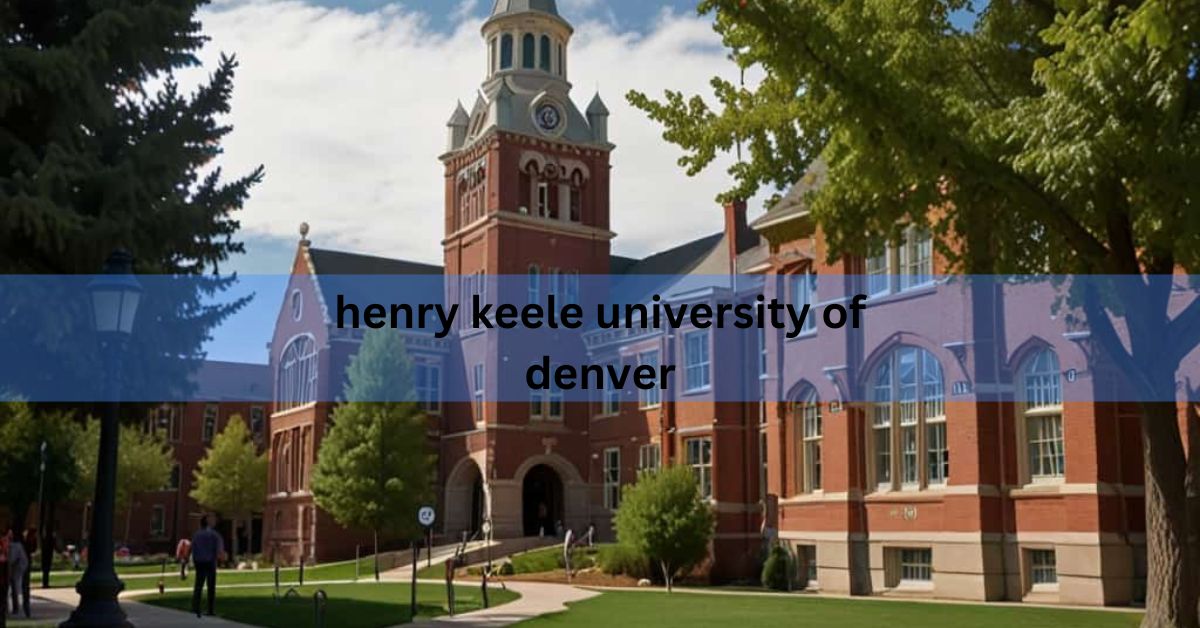The University of Denver has long been recognized as an institution dedicated to academic rigor, innovation, and leadership development. Among the many distinguished figures associated with the university, Henry Keele has made a significant impact. His contributions to education, research, and institutional growth have shaped the university’s reputation as a center for intellectual and professional advancement.
This article will explore Henry Keele’s connection with the University of Denver, his influence on academia, and his lasting legacy in higher education. Additionally, we will analyze how his work aligns with the university’s mission and broader trends in higher education.
The University of Denver: A Hub for Innovation

A Brief History of the University of Denver
Founded in 1864, the University of Denver (DU) is one of the oldest private universities in the Rocky Mountain region. It has a strong reputation for fostering academic excellence, research innovation, and leadership development. With a diverse student body and a commitment to interdisciplinary learning, DU continues to shape the next generation of professionals and scholars.
Academic Programs and Institutional Strength
DU offers a wide range of undergraduate, graduate, and professional programs across multiple disciplines, including business, law, social sciences, engineering, and the arts. The university is known for its commitment to experiential learning, providing students with hands-on opportunities to engage with real-world challenges.
Henry Keele’s association with the University of Denver further cements the institution’s reputation for fostering thought leaders who make meaningful contributions to academia and society.
Who is Henry Keele?
Background and Education
Henry Keele is a name synonymous with academic excellence and institutional development. While specific details about his early life and education may vary, Keele is widely regarded for his contributions to higher education, research, and policy.
His career path reflects a dedication to fostering intellectual growth, supporting student success, and driving institutional change. Whether through research, teaching, or administrative leadership, Keele has played a role in shaping the academic landscape.
Also Read: Bug Sticks – The Ultimate Guide to Stick Insects & Their Care!
Contributions to the University of Denver
Henry Keele’s affiliation with the University of Denver highlights his commitment to fostering a culture of innovation and intellectual inquiry. His contributions span various areas, including:
- Academic Leadership: Keele has been involved in developing educational programs that emphasize critical thinking, interdisciplinary collaboration, and real-world applications.
- Research Initiatives: His work in research has helped advance knowledge in multiple fields, ensuring that the university remains at the forefront of academic inquiry.
- Institutional Development: Keele has played a role in shaping policies and strategies that enhance student learning experiences and faculty development.
The Impact of Henry Keele on Higher Education:
Advancing Research and Scholarship
One of the defining aspects of Keele’s legacy is his commitment to research excellence. Whether in the sciences, humanities, or professional studies, his work has contributed to expanding knowledge and addressing contemporary challenges.
By fostering a research-driven culture, Keele has helped elevate the University of Denver’s standing in academic circles, attracting scholars, funding, and recognition from global institutions.
Enhancing Student Learning Experiences
Keele’s impact is also evident in the way students engage with their education. He has advocated for active learning, mentorship, and student-centered approaches that go beyond traditional lecture-based teaching. His influence on pedagogy ensures that students gain not only theoretical knowledge but also practical skills necessary for success in their careers.
Institutional Leadership and Growth
Keele’s contributions extend to policy development and institutional strategy. His efforts have supported:
- The expansion of academic programs
- Strengthening faculty recruitment and retention
- Enhancing research funding and collaboration
- Increasing diversity, equity, and inclusion initiatives
These efforts align with the University of Denver’s long-standing mission to provide high-quality education while adapting to the evolving needs of students and society.
The Future of Higher Education and Keele’s Legacy:
Emerging Trends in Higher Education

As higher education undergoes significant transformation, Henry Keele’s work remains relevant in shaping the future of universities. Some key trends that align with his vision include:
- Interdisciplinary Learning: Encouraging students to explore multiple fields of study to develop a well-rounded perspective.
- Technology Integration: Leveraging digital tools, artificial intelligence, and online learning platforms to enhance education.
- Global Collaboration: Building partnerships with institutions worldwide to promote knowledge exchange and innovation.
- Student-Centered Education: Focusing on experiential learning, internships, and real-world problem-solving.
- Equity and Inclusion: Ensuring that higher education remains accessible to students from diverse backgrounds.
Also Read: Weathering With You Room for Only 280 Yen – A Cinematic Escape on a Budget!
Henry Keele’s Lasting Influence
Keele’s work aligns with these evolving trends, ensuring that his contributions will continue to inspire educators, students, and policymakers. His commitment to research, teaching, and institutional development has left a lasting imprint on the University of Denver and higher education as a whole.
FAQ’s:
1. Who is Henry Keele?
Henry Keele is an academic leader known for his contributions to higher education, research, and institutional development, particularly at the University of Denver.
2. What is the University of Denver known for?
The University of Denver is recognized for its strong academic programs, research excellence, and commitment to interdisciplinary learning and leadership development.
3. How has Henry Keele influenced the University of Denver?
Keele has played a key role in academic leadership, research initiatives, and institutional growth, helping to shape the university’s direction and impact.
4. What areas of research has Henry Keele contributed to?
While specific details may vary, Keele’s work has spanned multiple fields, including policy development, interdisciplinary studies, and higher education advancements.
5. How does Henry Keele’s work impact students?
Keele has advocated for student-centered education, experiential learning, and mentorship, ensuring that students gain valuable skills and knowledge beyond traditional classroom settings.
6. What are some of the key academic programs at the University of Denver?
DU offers programs in business, law, social sciences, engineering, arts, and sciences, with a focus on innovation and real-world applications.
7. How has Henry Keele contributed to institutional policy?
Keele has helped develop policies that enhance faculty recruitment, research funding, diversity initiatives, and overall university strategy.
8. What trends in higher education align with Keele’s work?
Interdisciplinary learning, technology integration, global collaboration, student-centered education, and equity initiatives align with Keele’s contributions.
9. What role does research play at the University of Denver?
Research is a core component of DU’s mission, with a focus on innovation, problem-solving, and advancing knowledge in various disciplines.
10. How can students and faculty benefit from Keele’s legacy?
By embracing Keele’s emphasis on research, critical thinking, and institutional development, students and faculty can contribute to a thriving academic environment and meaningful societal impact.
Closing Remarks:
Henry Keele’s contributions to the University of Denver highlight the importance of academic leadership, research excellence, and student-focused education. As the landscape of higher education continues to evolve, Keele’s impact remains a guiding force in shaping the future of learning and institutional development.
Read More:




